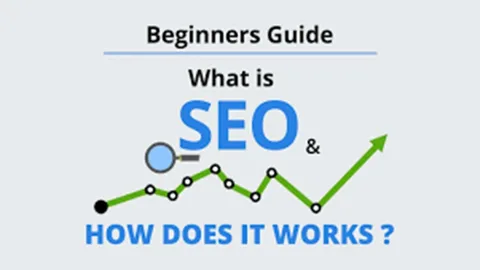Search Engine Optimization (SEO) is an essential aspect of digital marketing that helps websites rank higher in search engine results pages (SERPs). Understanding SEO basics is crucial for beginners who aim to improve their website’s visibility and drive organic traffic.
Why is SEO crucial for anyone with an online presence?

Well, think about how you typically find information on the internet. You probably turn to search engines and type in keywords related to what you're looking for. The search engine then presents you with a list of results that it deems most relevant to your query.
Now, imagine if your website or online content doesn't appear on the first page of those search results. Chances are, very few people will find your website, and your online presence will suffer as a result. This is where SEO comes in. By optimizing your website for search engines, you increase the likelihood of your website appearing higher in the search results, driving more organic traffic to your site.
There are several key aspects of SEO that you need to understand to get started. First and foremost, you need to conduct keyword research to identify the terms and phrases that your target audience is using to search for information related to your business or industry. Once you have a list of relevant keywords, you can strategically incorporate them into your website's content, including titles, headings, and body text.
What is SEO ?

SEO, or Search Engine Optimization, is the process of enhancing a website's visibility in search engine results. The main goal is to improve a website's ranking on search engine results pages (SERPs), thus boosting organic (non-paid) traffic to the site. SEO encompasses a range of strategies and techniques to accomplish this objective.
Why Is SEO Important?

SEO, or Search Engine Optimization, is important for several reasons:
1. Increased visibility:
SEO plays a vital role in your website's online visibility. By optimizing your site, it climbs the ranks on search engine results pages (SERPs), ultimately becoming more visible to users. This heightened visibility translates into an increase in organic traffic to your website. Consequently, it's imperative to understand the significance of SEO and its impact on attracting a broader audience to your online platform.
2. Targeted traffic
Furthermore, SEO empowers you to fine-tune your website to target specific keywords or phrases directly related to your business. Consequently, you can draw in users actively seeking products or services similar to yours. This heightened relevancy enhances the likelihood of converting these users into satisfied customers, highlighting the pivotal role that SEO plays in connecting businesses with their ideal audience.
3. Credibility and trust
Moreover, websites that secure higher positions in search engine rankings tend to instill greater confidence and trust among users. Consequently, a robust SEO strategy not only enhances your online visibility but also contributes to building your brand's reputation. This, in turn, establishes your authority within your industry, solidifying your position as a credible and trustworthy resource for users seeking your products or services.
4. Better user experience
Additionally, SEO encompasses the enhancement of your website's structure, content, and design to create a more user-friendly experience. This comprehensive approach entails optimizing aspects such as page loading speed and ensuring mobile responsiveness. Furthermore, it involves delivering content that is both relevant and valuable to your audience. The result? A positive user experience that drives higher engagement, encourages longer site visits, and significantly bolsters your chances of conversions.
5. Cost-effective marketing
Compared to other marketing strategies, SEO is relatively cost-effective. Organic search traffic is unpaid, and once your website starts ranking well, the ongoing maintenance and optimization costs are relatively low. It can provide long-term benefits and a high return on investment (ROI).
6. Competitive advantage
In the present digital era, the majority of businesses possess an online presence. By implementing a robust SEO strategy, you gain a competitive advantage over your rivals as it ensures that your website ranks higher in search results, thus attracting a larger pool of potential customers.
SEO Elements

To excel in SEO, it's essential to grasp the multiple elements that play a pivotal role in enhancing a website's visibility. Here are some key components to consider:
1. Keywords
Keywords, the words or phrases users input into search engines, are integral to SEO. Therefore, conducting thorough keyword research is essential as it aids in pinpointing the specific terms your target audience is actively searching for.
2. On-Page SEO
On-page SEO (Search Engine Optimization) refers to the optimization of individual web pages to improve their visibility and ranking on search engine results pages (SERPs). This process involves various techniques and strategies focused on optimizing the content and HTML source code of a specific webpage. The primary goal of on-page SEO is to make the webpage more appealing to both search engines and human users, ultimately leading to higher search engine rankings and better organic (non-paid) search traffic.
3. Off-Page SEO
Off-page SEO, also known as off-site SEO, refers to the set of strategies and activities that are performed outside of your own website with the goal of improving its search engine rankings and online visibility. While on-page SEO focuses on optimizing the content and structure of your website itself, off-page SEO revolves around building your website's authority, credibility, and reputation on the internet through various external factors and actions.
4. Technical SEO
Unlike on-page and off-page SEO, which primarily focus on content and external factors, technical SEO deals with the backend and structural aspects of a website that affect its ability to be crawled, indexed, and ranked by search engines. It ensures that a website is technically sound and user-friendly, which, in turn, enhances its overall SEO performance.
5. Content
Quality content is at the heart of SEO. Creating valuable, informative, and engaging content that addresses user queries can improve your site's visibility.
Getting Started with SEO
If you're new to SEO, here are some steps to help you get started:
1. Keyword Research
Keyword research, in essence, is the systematic process of identifying and selecting relevant words or phrases that users employ when conducting searches on search engines. This process serves as the foundation for optimizing a website's content and improving its visibility in search engine results pages (SERPs).
2. On-Page Optimization
On-page optimization refers to the practice of fine-tuning and improving various elements directly on your website's pages to make them more attractive to search engines. This optimization involves things like adjusting titles, headings, and content to include specific keywords that people might use when searching online. It also includes ensuring that your website loads quickly and works well on mobile devices. All these efforts aim to make your web pages rank higher in search engine results, making it easier for people to find your site when they search for related topics.
3. Quality Content
Quality content, in straightforward terms, refers to the creation and presentation of online information that is not only valuable but also well-crafted. This content is designed to inform, engage, or entertain the audience while offering genuine insights or solutions.
4. Link Building
Link building, in simpler terms, involves the strategic process of acquiring links from other websites to your own. These links function as digital pathways, guiding users from one webpage to another across the vast online landscape. They serve as recommendations or referrals, suggesting to both users and search engines that your website holds value and relevance. . Consequently, this can contribute to higher search engine rankings, attracting more visitors interested in your content or offerings. Think of it as building a digital web of connections that enhance your online presence.
5. Monitor and Analyze
Monitoring and analyzing, in simpler terms, means keeping a close eye on the performance of your website and then carefully studying the data you gather.
6. Stay Informed
SEO is constantly evolving. Stay updated with industry news and algorithm changes to adapt your strategies accordingly.
Final Thoughts
While this guide covers the basics, there's much more to explore as you delve deeper into the world of SEO. By mastering the fundamentals and staying informed about industry trends, you can enhance your website's visibility and drive organic traffic, ultimately achieving your online goals.
Remember, SEO is not a one-time task but an ongoing process that can yield long-term benefits for your online presence.



